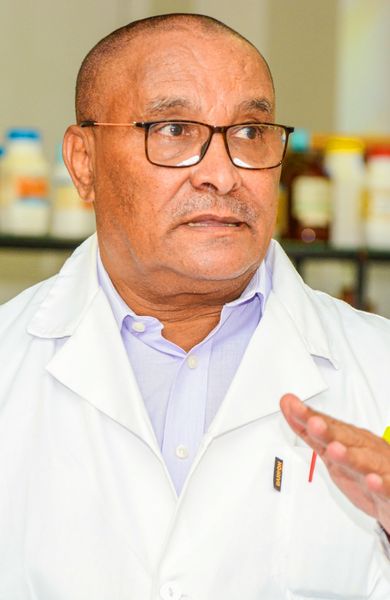Scientists working to find a suitable treatment for COVID-19 related ailments at the National University of Lesotho (NUL) Innovation Hub have developed potential herbal mixtures that have passed the first category of pharmacological tests. This is a stage where the mixtures are tested for safe use in human body (toxicity tests). The scientists have developed the herbal mixtures from local medicinal plants and each of the mixtures have undergone extensive scientific testing.This is just one of the major steps in a long process.A few months ago, we announced that the NUL Innovation Hub scientists are entering a race in search for COVID-19 treatment. The team is led by Dr. Lerato Seleteng-Kose, whose research focuses on medicinal plants traditionally used in Lesotho. Other team members include Prof. Mosotho George- Chemistry, Dr. Liteboho Maduna- Medical Microbiology, Mr Oriel Hlokoane- MSc in Medicinal Chemistry and Mr Motiki Beleme- BSc in Chemical Technology. You will recall that the aim of this work is to develop and test the medicinal plant mixtures’ potential to attack COVID-19 related respiratory ailments and, if possible, the coronavirus itself. Here are the milestones achieved so far: 1) The team screened some locally available plants for pharmacological activity (antimicrobial and anti-inflammatory activity as well as phytochemistry). A number of them were found to be active against respiratory ailments as confirmed by previous scientific studies. A summary of the pharmacological screening of the plants has been carefully documented by the scientists.2) Some of the screened medicinal plants were selected for development of the mixtures because they proved to be more effective against respiratory ailments. Please note that the scientists are not endorsing these plants as “cure” for COVID-19. There is no known successful treatment yet. The race is ongoing. 3) The scientists then prepared medicinal plant mixtures using some of the selected plants (with different combinations of plants mixtures). 4) These mixtures were then subjected to safety assessment at the Department of Pharmacy at the Faculty of Health Sciences (NUL). The assessment was for microbial contamination, heavy metals and acidity/alkalinity. The certification of analysis has been released indicating that the potential remedies are safe (non-toxic) at given concentrations. The next steps will be to test if the herbal mixtures could be active against the coronavirus itself. To achieve this, the scientists have already established contact with the Council of Scientific and Industrial Research (CSIR) in South Africa for potential screening of the medicinal plant mixtures for Anti-SARS-COV-2 (Covid-19) laboratory (in vitro) effectiveness, with the assistance of the Lesotho Department of Science and Technology.5) The team is also in contact with the Department of Science and Technology (Lesotho) and the Department of Science and Innovation (South Africa) under a Joint Bilateral Commission of Cooperation (JBCC) between the two countries, in terms of research and development (focusing on indigenous knowledge and medicinal plants).6) The concept note for this initiative has already been presented at the National Command Centre in May 2020 (Now National Covid-19 Secretariat, NACOSEC) and the Lesotho Defence Force for potential support.Moving forward, the next steps will be drug development which will also involve clinical tests (in vivo) to ensure the effectiveness of the mixtures both against the COVID-19 and its related ailments in patients. These steps will be followed by drawing up of a plan to establish plantations where the plants will be propagated to ensure their sustainable use and to prevent extinction.


